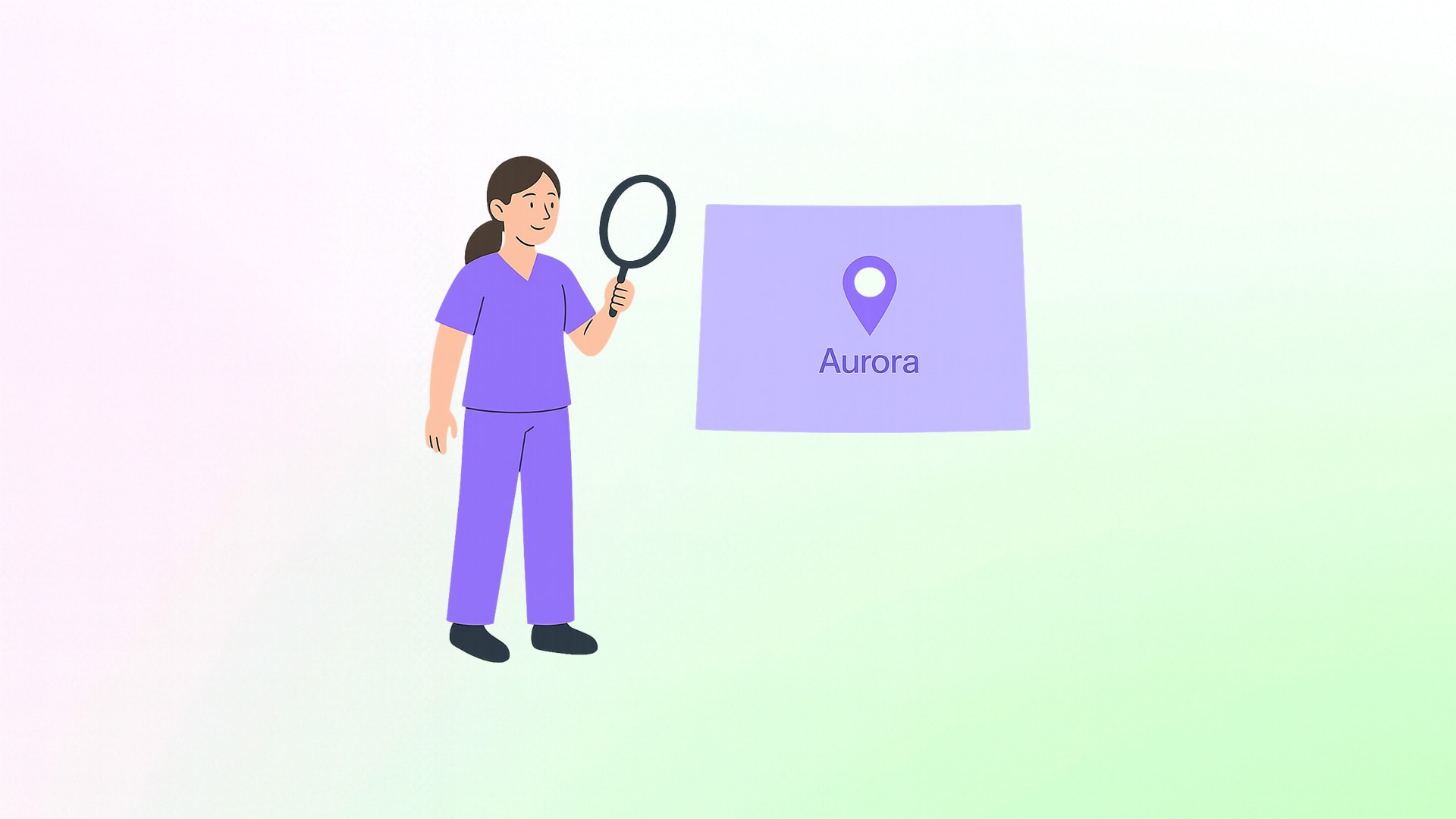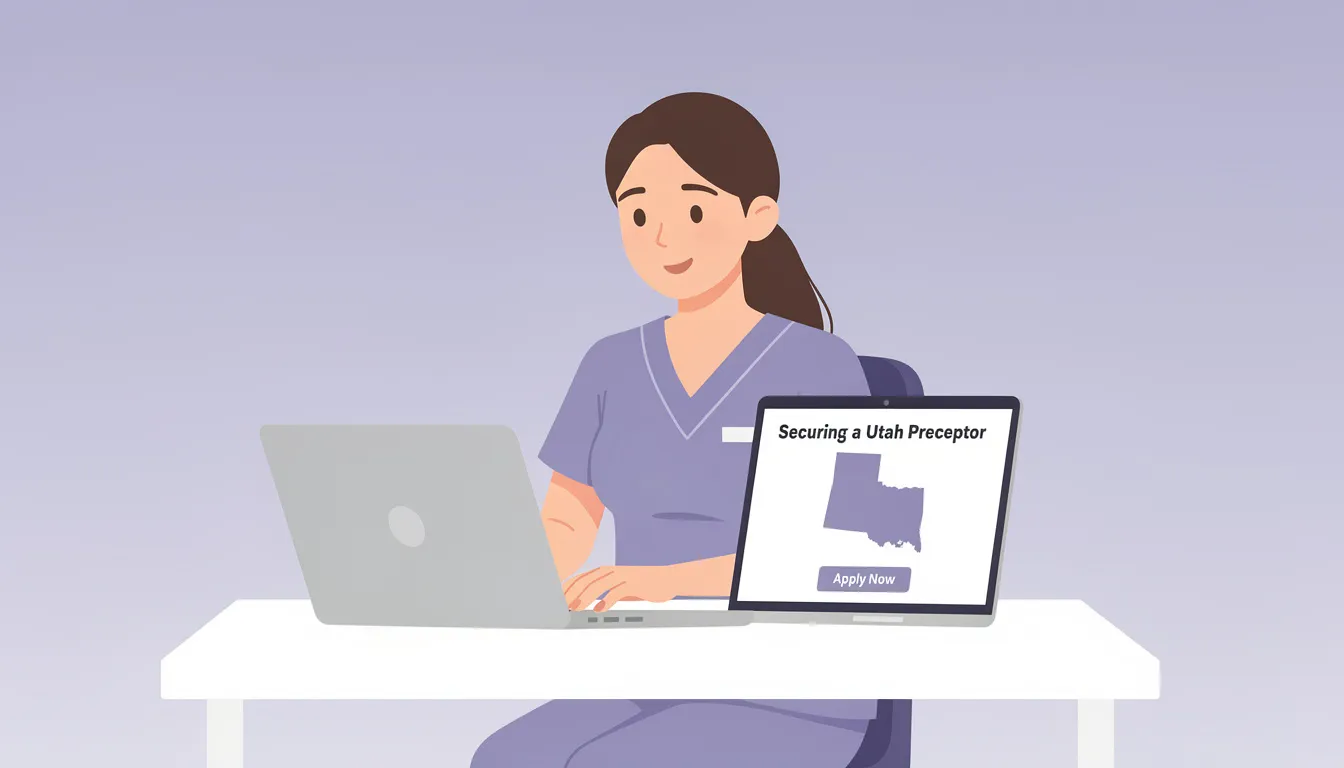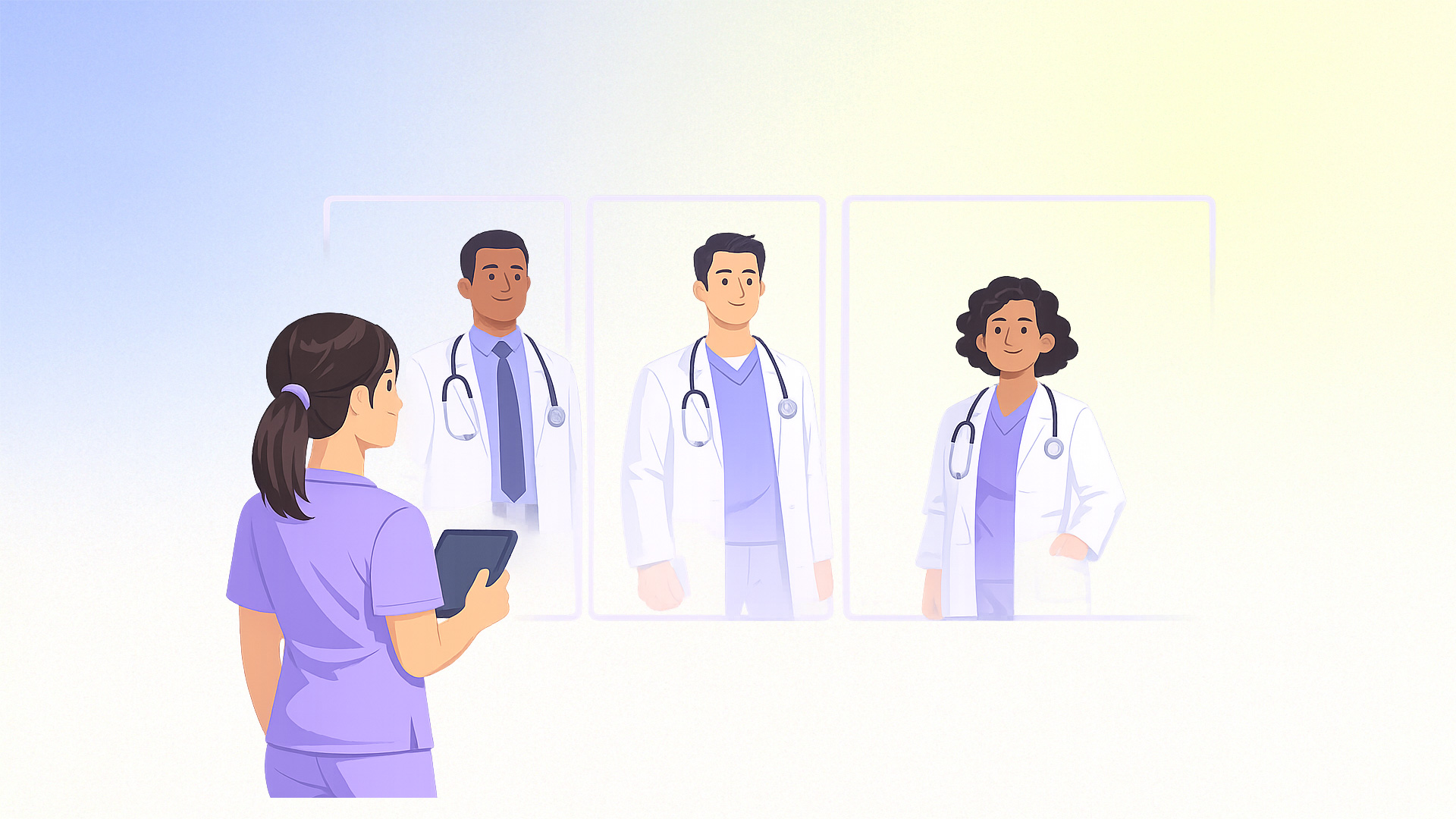To find an Aurora nurse practitioner preceptor, start by identifying local clinics, hospitals, and advanced practice providers who align with your program’s specialty requirements. Most NP students secure Aurora clinical placements through structured outreach, faculty connections, or preceptor matching services like NPHub that connect you with vetted, school-approved preceptors ready to teach.
TL;DR: Finding an Aurora Nurse Practitioner Preceptor: Step-by-Step for NP Students
- Finding an Aurora nurse practitioner preceptor is one of the biggest challenges for NP students — most hospitals prioritize affiliated programs, leaving limited openings.
- Aurora offers exceptional clinical placements through institutions like UCHealth and Children’s Colorado, but paperwork and approval timelines can delay progress.
- DIY outreach works when done strategically: personalize your messages, follow up consistently, and stay organized while tracking every contact.
- If deadlines are approaching or communication stalls, preceptor matching services like NPHub can connect you with vetted, school-approved preceptors fast.
- Create your free NPHub account to explore available Aurora preceptors, complete your rotations on time, and move one step closer to becoming a confident, licensed NP.
The Reality of Finding a Preceptor in Aurora
You’ve refreshed your inbox three times in the last hour. Still nothing. The clinic you emailed two weeks ago hasn’t replied, and the one you called yesterday told you they’ve already taken students for the semester. Now your rotation date is getting closer, and you’re starting to wonder if you’ll ever find an Aurora nurse practitioner preceptor in time.
It’s a feeling almost every nurse practitioner student in Aurora knows too well. You’re juggling coursework, maybe a job, family responsibilities and on top of it all, the endless search for a clinical placement.
The truth is, even the most organized students get stuck here. Not because they’re unprepared, but because Aurora is one of the busiest healthcare education hubs in Colorado.
The city is home to the University of Colorado Anschutz Medical Campus, UCHealth University of Colorado Hospital, Children’s Hospital Colorado, and major systems like Advocate Health Care and Aurora Health Care, all training hundreds of graduate students, clinical nurse specialists, physician assistants, and nurse practitioners each year.
That means competition for clinical rotations in specialties like family medicine, pediatrics, and psychiatry is intense.
And yet, Aurora is exactly where many of the best advanced practice providers in the state begin. It’s a city built on collaboration where nurses, physicians, and nurse practitioners work side by side in direct patient care to serve the community.
Every clinical rotation here offers hands-on experience and ongoing support, helping you strengthen your clinical skills, build confidence, and prepare for licensure and long-term career advancement.
If you’re ready to skip the uncertainty and focus on your growth, create your free NPHub account today. You’ll get connected with vetted Aurora preceptors who meet your school’s approval standards, provide structured mentorship, and help you complete your clinical training on time. One simple step can turn the stress of searching into the satisfaction of moving forward.
Now, let’s dive into the key universities and healthcare systems in Aurora that play a crucial role in supporting NP students and explore where you can begin your journey toward a successful clinical placement.
Aurora Clinical Placements Landscape
In Aurora, opportunity and competition live side by side. It’s one of the most advanced healthcare communities in Colorado, home to world-class hospitals and teaching institutions that prepare the next generation of nurse practitioners, clinical nurse specialists, and advanced practice providers.
But that level of excellence comes with structure, strict processes, and long waitlists that can make securing a clinical placement feel like a marathon.
Let’s take a closer look at two of the city’s most sought-after institutions for NP students and what you need to know before you reach out.
Children’s Hospital Colorado
If you’re passionate about pediatrics or family medicine, Children’s Colorado is one of the most respected places to train in the region. The hospital partners exclusively with accredited higher education programs to provide structured clinical rotations, practicums, and externships for nurse practitioner students and graduate students pursuing advanced practice degrees.
Placements here are designed to give you true hands-on experience with patients while aligning closely with your clinical learning objectives and degree requirements. But because Children’s Colorado handles all student placements through a centralized student placement program, students are prohibited from reaching out to individual sites or preceptors directly.
That means everything, from applications to approval, must go through your school’s coordinator. It’s a controlled process that ensures fairness and compliance with institutional standards, but it also means opportunities are limited. If your program doesn’t already have an active affiliation contract with Children’s, you won’t be able to rotate there.
For students lucky enough to get in, the experience is transformative. You’ll gain direct exposure to collaborative health care teams, deepen your clinical skills, and learn from professionals who are setting the standard for pediatric nursing practice across the country.
UCHealth / University of Colorado Hospital
Then there’s UCHealth University of Colorado Hospital, a cornerstone of Aurora’s medical community and one of the most competitive placement sites in the state. UCHealth prioritizes current University of Colorado advanced practice students, UCHealth/UCDenver employees enrolled in accredited programs, and students attending Colorado-based schools.
If your program isn’t already affiliated with UCHealth, that creates an extra hurdle. To even be considered for a clinical rotation, your school must have a formal Affiliation Agreement in place, and that contract process can take months to finalize.
Until it’s fully approved, your placement request stays on hold. UCHealth will not move forward with unaffiliated or provisionally accredited programs, and even for approved schools, the onboarding process (paperwork, badging, and access) typically takes around three months.
It’s a long and structured process, one that ensures compliance with state and federal laws, hospital accreditation standards, and the safety of every patient, student, and provider. But it also means many NP students struggle to find available preceptors in time, especially if their programs aren’t formally connected.
For those who do secure a placement, the payoff is enormous: immersive exposure to inpatient and outpatient care, access to complex cases, and mentorship from some of the best nurse practitioners and physicians in the country. It’s not just a rotation, it’s a deep dive into the highest level of advanced practice medicine.
Both of these organizations play a crucial role in shaping Aurora’s health care landscape and training the next generation of nurse practitioners. But their structured systems also make it difficult for students outside affiliated programs to secure placements quickly, even when they’re highly qualified and eager to learn.
That’s where flexibility becomes your greatest strength. Some students succeed by expanding their search to community clinics, family practices, and home health organizations that offer more direct access to preceptors.
Others choose to work with preceptor matching services like NPHub, which streamline the entire process — from matching you with approved Aurora preceptors to managing your documentation and school approvals so you can focus on learning, not logistics.
But even in a city filled with opportunity, the system can feel stacked against you. You can do everything right, keep your GPA up, apply early, follow every step your school gives you, and still end up waiting months for an answer that never comes.
That’s why so many nurse practitioner students in Aurora start looking beyond large hospitals to independent preceptors, smaller clinics, and preceptor matching services that make the process faster and more transparent.
If you’re ready to take control of your clinical placement, start by creating your free NPHub account. You’ll be able to browse available preceptors across Aurora, filter by specialty, and view real openings that meet your program’s requirements, no guessing, no cold calls, no waiting on emails that might never come.
Now, let’s dive into a step-by-step guide to finding a preceptor on your own and what you can do today to stand out, get responses, and move closer to your next clinical rotation.
Quick Start DIY Guide to Finding a Preceptor in Aurora
When time is tight and your inbox is empty, doing it yourself might feel like the only option left. And honestly? Many nurse practitioner students in Aurora do find their clinical placements this way, it just takes strategy, patience, and persistence.
Here’s how to start strong and give yourself the best shot at finding your own Aurora nurse practitioner preceptor:
Step 1: Start With the Right Research
Before you hit send on a single email, start by getting clear on who you want to learn from and where you’d like to practice. Aurora has a rich variety of clinical environments, from large hospital systems to small community clinics.
- Begin by listing family medicine, pediatrics, psychiatry, and home health practices in the area.
- Look at Aurora Health Care, UCHealth, and other local networks employing nurse practitioners, clinical nurse specialists, and physician assistants.
- Focus on clinics or hospitals whose patient populations align with your program’s clinical learning objectives.
- Spend a few minutes reading about each provider online. Learn their specialty, community involvement, or areas of focus, anything that helps you make a genuine connection when you reach out.
This prep work takes time, but it’s the difference between sending a generic request and crafting a message that actually lands.
Step 2: Craft a Message That Feels Human
The tone of your first message can make or break your chances. The clinicians you’re contacting are balancing direct patient care, leadership duties, and their own professional lives. They don’t have time for a copy-pasted email.
Here’s what makes a message stand out:
- Keep it short, specific, and personal. Mention something you admire about their practice, such as their approach to patient care, community involvement, or the kind of medicine they practice.
- Show you’ve done your homework. If they specialize in family medicine, acknowledge their role in advancing primary care in Aurora.
- Make it easy to respond. End with a simple ask, such as:
“Would you be open to a brief conversation about a potential clinical rotation opportunity this semester?”
People respond to sincerity, not desperation. When you write like a professional peer instead of a student begging for help, you’ll stand out immediately.
Step 3: Have Your Documents Ready to Go
Nothing kills momentum faster than being unprepared. When a preceptor or clinic finally replies “yes,” you’ll want to respond within hours, not weeks.
Gather everything your school might need before you even start contacting sites:
- A polished CV or résumé that highlights your clinical and volunteer experience.
- Proof of liability insurance, immunizations, and a recent background check.
- Your preceptor approval forms and affiliation agreement (if applicable).
- Contact details for your faculty advisor or clinical coordinator — some sites may reach out for verification.
If your program isn’t already affiliated with a clinical site, get that process started early. Affiliation contracts can take months, and many hospitals won’t even review your application until the paperwork is complete. Being ready signals reliability, a quality every preceptor values.
If you already have your paperwork ready and just need help finding the right preceptor, create your free NPHub account and get access to Aurora preceptors who are already vetted, approved, and available for your upcoming clinical rotation.
Step 4: Follow Up (and Don’t Take Silence Personally)
This part feels uncomfortable but it’s where persistence pays off. Preceptors receive dozens of messages, and yours can easily get buried. That doesn’t mean they’re not interested, it just means life gets in the way.
- Wait about one week before sending a follow-up.
- Keep your message polite and professional:
“I wanted to follow up to see if you’ve had a chance to review my request for a clinical rotation. I’d still love the opportunity to learn from your team.” - Always thank them for their time, even if the answer is no. Gratitude builds bridges and today’s “no” might be next semester’s “yes.”
Following up shows initiative and commitment, two things every advanced practice provider looks for in a student.
Step 5: Expand Your Network and Ask for Referrals
Sometimes, opportunity doesn’t come from the clinic you emailed, it comes from someone who knows someone. Start tapping into every connection you have:
- Talk to your classmates and alumni. Ask where they’ve rotated and whether their preceptors are open to additional students.
- Join professional groups. Colorado NP associations, Aurora-based NP Facebook groups, and LinkedIn communities often post open preceptorships.
- Ask your current or former employers. If you’re an RN, a faculty member, or even a hospital volunteer, mention your need for a placement. Personal recommendations go a long way.
- Look beyond big systems. Independent practices, home health agencies, and smaller clinics often have more flexibility and more time for true mentorship.
Networking isn’t about luck; it’s about consistency. Every message, conversation, and introduction builds momentum.
Bonus Tip: Track Every Step Like It’s Part of Your Clinical Hours
Organization can save you when stress hits. Keep a simple record of every contact, who you reached out to, when, and what they said. It’ll help you stay on top of follow-ups and give you something tangible to show your faculty if your placement hasn’t been secured yet.
Your tracking sheet can include:
- Clinic name and contact (phone, email, or LinkedIn).
- Date of outreach and any follow-ups.
- Response status (no reply, declined, pending, referred).
- Notes about each site, like if they only take students in certain specialties or at specific times of year.
This simple system can turn a chaotic process into a manageable plan and it’s proof that you’re doing everything in your power to move forward.
If your list keeps growing and no one’s replying, it may be time to save yourself weeks of stress. Create your free account at NPHub and explore real, school-approved preceptors in Aurora today. Your next rotation could be confirmed before you finish your next email draft.
When Preceptor Matching Services Become the Right Move
Even the most organized students eventually hit a wall, not from lack of effort but from how the system is designed.
Large hospitals like UCHealth and Children’s Colorado operate under strict affiliation rules that limit how many graduate students they can take each semester. Smaller clinics, meanwhile, are overwhelmed with requests from NP students, physician assistants, and clinical nurse specialists all competing for the same few preceptors.
That’s why, for many nurse practitioner students, professional preceptor matching services have become a realistic and strategic part of the process. These services exist to bridge the gap between students who are ready to learn and providers who want to teach but don’t have time to manage the logistics.
Here’s what they do differently:
- They save you time. Instead of waiting weeks for responses, your clinical placement can be confirmed in days.
- They manage the details. The service coordinates with your school, ensures documentation meets requirements, and verifies that your preceptor is fully qualified and approved.
- They protect your progress. If your placement falls through, they handle replacements quickly — no scrambling, no lost semesters.
- They reduce uncertainty. You’ll know exactly who your preceptor is, what your rotation entails, and that every requirement is covered before you start.
For many students, using a matching service means protecting their investment of time, money, and hard work. Because missing a semester doesn’t just delay graduation; it delays their entire career advancement and the impact they're ready to make in patient care.
And that’s where NPHub stands apart. With over 10,000 successful placements, NPHub gives you transparency, support, and peace of mind from start to finish.
So if your search has stalled or your deadline is closing in, don’t see it as failure, see it as your cue to pivot toward a smarter, faster solution. You’ve done the groundwork; now it’s time to move forward with a team that knows how to get you across the finish line.
Secure Your Aurora Clinical Placement and Move Forward with the Right NP Preceptor
If you’ve made it this far, it’s because you care about your patients, your growth, and the kind of nurse practitioner you’re becoming. You’ve spent years mastering the science, balancing the workload, and putting others first. You’ve already done the hardest part: showing up and staying committed.
But commitment alone shouldn’t be what holds you back. The truth is, the system doesn’t always make it easy for NP students to succeed and you shouldn’t have to fight this hard just to finish what you started.
That’s why NPHub exists. We help students like you find qualified preceptors, confirm school-approved placements, and move forward without the constant uncertainty. You’ve already proven you’re capable. Now it’s about getting across the finish line with the support you deserve.
So take a breath, shake off the stress, and remember why you started this journey. You’re not just finding a clinical rotation, you’re stepping into your calling.
Create your free NPHub account, explore available Aurora preceptors, and take your next confident step toward graduation and your future in advanced practice nursing.
Frequently Asked Questions About Finding a Nurse Practitioner Preceptor in Aurora
1. How can I find a nurse practitioner preceptor in Aurora, Colorado?
Start by identifying clinics, hospitals, or private practices that align with your program’s specialty requirements. Aurora offers opportunities in family medicine, pediatrics, psychiatry, and home health settings. If you’re short on time, consider using a preceptor matching service like NPHub to connect directly with vetted Aurora preceptors who are already approved to teach NP students.
2. Do Aurora hospitals like UCHealth or Children’s Colorado accept outside NP students?
They do, but availability is extremely limited. Both hospitals prioritize University of Colorado students and those from affiliated programs. If your school doesn’t already have a formal agreement in place, it may take months to establish one — so always confirm affiliation early.
3. What are the benefits of finding my own preceptor versus using a matching service?
Doing it yourself can be rewarding — you build relationships, network locally, and gain confidence in professional outreach. But it’s also unpredictable. Many students spend months searching without success. A matching serviceprovides guaranteed support, vetted preceptors, and faster placement so you can focus on your education instead of constant follow-ups.
4. How early should I start looking for my Aurora clinical placement?
Ideally, start 3–6 months before your intended rotation. Hospitals and clinics often finalize student placements far in advance. The earlier you begin, the better your chances of finding a qualified preceptor in your desired specialty.
5. Can I contact preceptors directly in Aurora?
For independent clinics and smaller practices, yes. But larger organizations like Children’s Colorado require all student placement requests to go through their centralized student placement program. Always check your school’s policies and each site’s requirements before reaching out.
6. What if my school doesn’t have an affiliation agreement with the site I want?
You can request that your school start one, but be aware it can take 6–12 weeks for review and approval. In some cases, the facility may decline to create new agreements. Services like NPHub can help you find preceptors at sites that already have the necessary paperwork in place.
7. Do preceptors in Aurora get paid or volunteer their time?
It depends on the site. Many nurse practitioners volunteer as preceptors to give back and help train the next generation, while others receive stipends through programs or matching services. Always ask upfront whether compensation or a school agreement is required.
8. What specialties are most in demand for NP preceptorships in Aurora?
The highest demand tends to be in family medicine, primary care, pediatrics, acute care, and psychiatry. These rotations often fill first due to their broad patient exposure and relevance to most NP programs.
9. How does NPHub’s Perfect Preceptor Promise protect students?
If your preceptor cancels, your school doesn’t approve a site, or something changes unexpectedly, NPHub guarantees a replacement or a full refund. The process is designed to eliminate the uncertainty that often comes with self-managed placements.
10. Is using a preceptor matching service worth it for NP students?
For many students, yes — especially those facing time-sensitive deadlines or limited local options. Matching services provide structured support, manage the logistics, and ensure compliance with your program’s requirements. It’s not a shortcut; it’s peace of mind when your graduation depends on the right placement.
Key Definitions for NP Students in Aurora
- Aurora Nurse Practitioner Preceptor
A licensed nurse practitioner in Aurora who provides direct supervision, mentorship, and evaluation to NP studentscompleting their required clinical rotations. Preceptors in Aurora guide students in applying classroom knowledge to real-world patient care in settings like family medicine, pediatrics, and psychiatry. - Aurora Clinical Placement
A formal agreement between an NP student, a healthcare organization, and an academic program that allows the student to complete hands-on training under supervision. In Aurora, placements often take place at institutions like UCHealth University of Colorado Hospital or within smaller community clinics and practices. - Advanced Practice Provider (APP)
A collective term for licensed clinicians who provide advanced patient care, including nurse practitioners, clinical nurse specialists, physician assistants, and certified nurse midwives. APPs in Aurora play a vital role in bridging healthcare access gaps and mentoring students in advanced practice nursing. - Affiliation Agreement
A legal contract between a healthcare site and a nursing school that allows students to complete clinical training there. In Aurora, large institutions like Children’s Colorado require active affiliation agreements before accepting NP students for rotations. - Preceptor Matching Services
Organizations that connect nurse practitioner students with qualified and vetted preceptors. These services streamline the search, verify school compliance, and secure placements faster than independent outreach. NPHub is one of the most trusted options for NP students seeking Aurora clinical placements. - Clinical Learning Objectives
The measurable skills, experiences, and competencies that NP students must achieve during a clinical rotation. Each placement in Aurora is designed to meet specific learning objectives established by the student’s academic program and national certification requirements. - Full Practice Authority (FPA)
A policy that allows Aurora nurse practitioners and other NPs across Colorado to evaluate, diagnose, and treat patients — including prescribing medications — without physician supervision. This independence creates rich learning environments for NP students during their rotations. - Graduate Nursing Student (GNS)
A registered nurse enrolled in an advanced nursing program such as an MSN, DNP, or post-master’s NP certificate. GNSs in Aurora often complete rotations in collaboration with Aurora Health Care, Advocate Health Care, or local community clinics.
About the author
- NPHub Staff
At NPHub, we live and breathe clinical placements. Our team is made up of nurse practitioners, clinical coordinators, placement advisors, and former students who’ve been through the process themselves. We work directly with NP students across the country to help them secure high-quality preceptorships and graduate on time with confidence. - Last updated
October 3, 2025 - Fact-checked by
NPHub Clinical Placement Experts & Student Support Team - Sources and references
- https://www.childrenscolorado.org/careers/professional-development/
- https://medschool.cuanschutz.edu/patient-care/office-of-advanced-practice/student-placement
- https://www.nphub.com/blog/preceptor-matching-recommended-by-schools-nationwide
- https://www.nphub.com/testimonials
- https://www.nphub.com/how-it-works
Find a preceptor who cares with NPHub
Book a rotation.webp)








.webp)


.webp)



%20(3)%20(2).svg)
.webp)